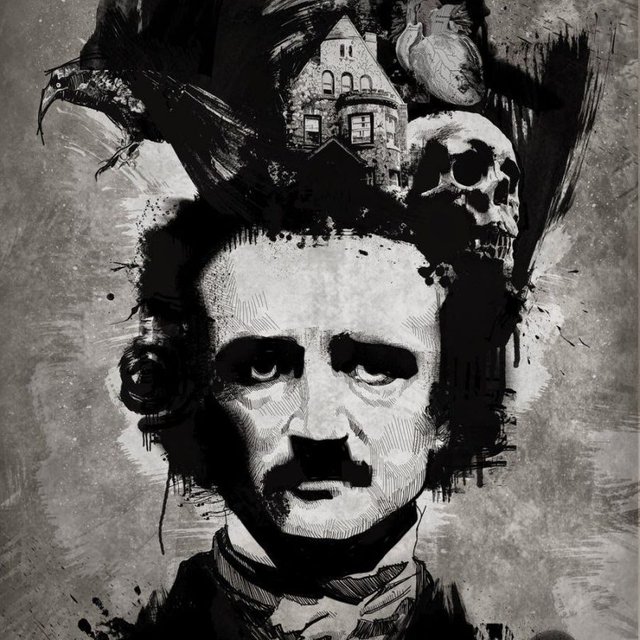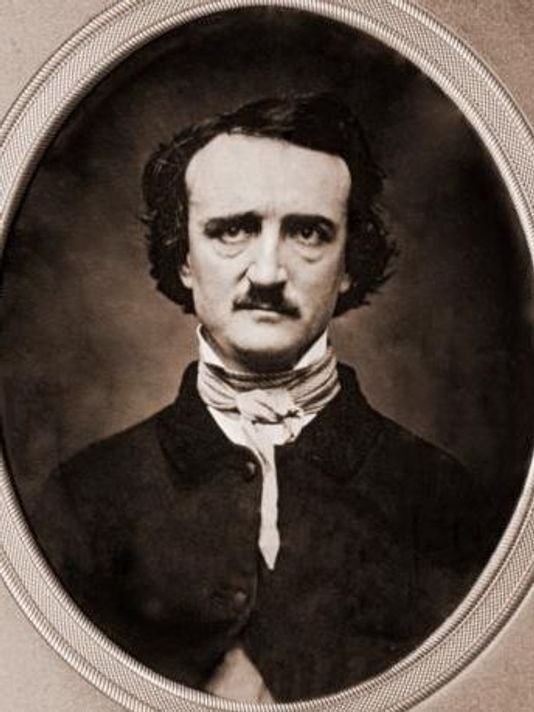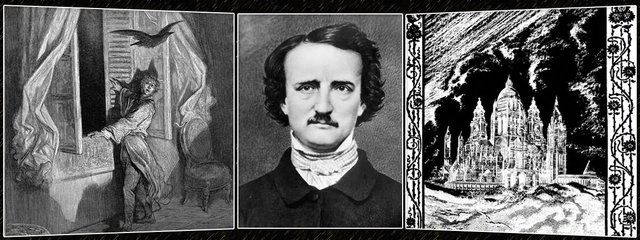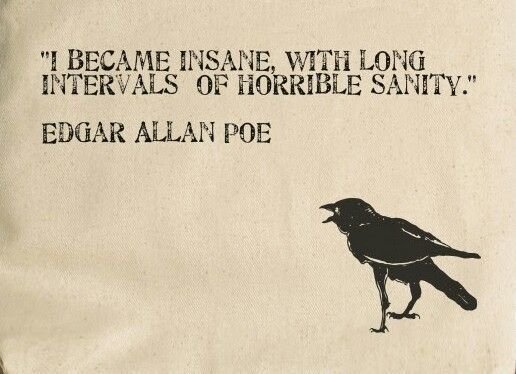ADSactly Culture - The Life of Tortured Artists #4 (Edgar Allan Poe)
Hello again, @adsactly readers. If you’ve been following, you know that for the past few days, we’ve engaged in a series on the tragic lives of tormented artists, featuring such greats as Van Gogh, Hemingway and Kurt Cobain (among others). And to be honest, I was pretty sure this series would end with the third installment, which focused on musical genius.
But then, scrolling through the comments we received on one of the previous posts, I noticed someone suggested we also have an installment on Edgar Allan Poe and Frida Kahlo and I thought that was a really interesting idea, so I figured I’d write more in this series (thank you @cristiancaicedo for the awesome suggestion!).
6. Edgar Allan Poe
Revered today by many as a true master of the horror genre (as well as one of the founding fathers of science fiction and the detective genre), Edgar Allan Poe’s like often made his work sound like small potatoes, in comparison.
It seems predictable, somehow, that the man who wrote such classics as the obsessive The Raven or the stomach-churning The Pit and the Pendulum, would have lived equally grim (well, maybe not equally…) moments in his own life, to be inspired to write such horrors.
Poe was born on the 19th of January 1809, the middle child of a couple of actors (so, not a family of great means). Interestingly, it’s believed by some that Edgar Allan Poe was named after the eponymous character in King Lear, which the couple were supposedly playing at the time of his birth.
Poe had a tumultuous childhood. His father left the family the year after his birth and his mother died of consumption in 1811, leaving Poe and his siblings orphans.
Edgar was unofficially adopted by a well-to-do merchant, John Allan, whom he remained with until early adulthood.
Poe’s relationship with his adoptive family became strained after Poe came into serious debt, as a young student, due to a passion for gambling, which his father didn’t approve of. It was around this time that his writing career started (mainly in an attempt to support himself), when he worked as a newspaper writer.
After this, Poe enrolled in the military at the age of 18, where he served for about two years, while also writing some short stories and poems (as well as some satirical verses about his commanding officers), but he eventually received an early discharge. He briefly reconciled with his adoptive father, but their relationship was still rocky.
One of the personal details about Poe that always draws attention is his marriage to his first cousin, Virginia Clemm, when he was 26 and she was only 13 years old, a rather unusual marrying age, even back then. It’s very probable that their marriage inspired a lot of his writing. And they were together for eleven years, until her death (also of consumption). The death of a beautiful, much beloved woman was a common theme in Poe’s writings (see Annabel Lee, for example) and it’s interesting to note that it was also a common theme in his short life. His mother’s death when he was two, then his step-mother’s death, when he was 20 and then, his wife’s death when he was in his early thirties, all of which had a profound impact on Poe’s mind and well-being.
Poe grew deeply unstable after his wife’s death. He had always had an alcohol problem, ever since his youth, which was only made worse by his wife’s illness (she first fell ill in 1842, five years before her death, and never completely recovered) and then, by her death. During her illness, he released perhaps his most haunting (and most famous) poem, The Raven, which appropriately mourns the loss of a beautiful, beloved woman. The poem enjoyed instant success.
Honestly, I think the most interesting aspect of Poe’s life was his death, ironically. Poe was found wandering the streets of Baltimore one early morning, utterly delirious at the relatively young age of forty. He was "in great distress, and… in need of immediate assistance", according to the man who found him.
He was taken to hospital, but never became conscious for long enough to explain what had happened to him and died some four days later. The whole incident was very strange, given that Poe was not wearing his own clothes when he was found and it’s said he kept repeating the name “Reynolds” (no one knew whom he might be referring).
Sadly, all records of his death were lost, so we don’t actually know why he died. It was believed to be from alcoholism (which wouldn’t really be a surprise), but popular theories have also claimed it was cholera, syphilis, delirium, heart disease as well as many other possibilities.
He lead a strange life, that much was certain, followed by tragedy from a very early age, which I suppose might explain his dark writings, at least to some extent.
It’s rather unfair that the image we now have of Edgar Allan Poe was greatly influenced by an article known as Griswold’s Memoir, written by Rufus Griswold, who had been a sworn enemy of Poe’s for many years. In his writings, he accused the writer of being a drunk madman, as well as a drug addict (there is no evidence to support that). And even though most of Griswold’s evidence turned out to be forged, it’s greatly influenced our view of the popular writer.
Authored by @honeydue
References: Wikipedia
Click on the coin to join our Discord Chat

Witness proposal is here:
Go To Steem Witness Page
In the bottom of the page type: adsactly-witness and press vote.

Use small letters and no "@" sign. Or, click here to vote directly!
Thank you!




A post that synthesizes Poe's life quite well, a life that is certainly dramatic; his death somehow matches his vision of life and his work. Beyond his difficult moments of economic hardship, abandonment of his natural and adoptive father, death of mother and wife, mistreatment at work, etc., the most important thing in his life will be his work, especially the narrative. About his contributions to modern literature, I wrote two posts for this blog (I don't know if you read them) a few weeks ago. I focused on it because its role in universal literary modernity is capital. Thank you for your article, @honeydue.
Like the previous characters, we find that Poe also had a difficult childhood. Added to this are his vices that were also making a hole in his personality, not to mention the death of his wife who ended up destroying him. The very fact of knowing that Poe was circling around his wife's grave, like a vulture, or like his famous crow, is a sign of the mental problem in which he was immersed. Reading this post I remembered the Uruguayan writer Horacio Quiroga, who also had a terrible life that marked all his work (I recommend it to you), and on the poetry side, a Venezuelan writer, José Antonio Ramos Sucre (I also recommend it to you), who not only had a life marked by health problems, but his work is proof of that cursed life. In the end, these two Latin writers decided to end their lives. A predictable ending in many artists! Thank you for this interesting series, @honeydue.
Yes, like with the others, although they all had fascinating minds, it's a bit frightening to imagine what it would be like being in their place, you know?
I hadn't heard of either but will definitely check them out!! They both sound interesting, thanks for the recommendation 😊
Posted using Partiko Android
Thanks for hearing (reading) my suggestion! Edgar Poe was one of the greatest and more tortured writers ever. I really liked this post, by the way, it was very complete. About his death there's a novel by Matthew Pearl called "The Poe Shadow" in which he gives a fictional explanation to that mistery. It worths reading the book. Greetings and thanks for sharing.
Cool, I hadn't heard about that novel, but will definitely check it out :) I've always had a fascination with Poe.
Thanks for suggesting it! I had loads of fun researching both him and Kahlo (I did read up on Kafka as well, but in the end decided against making a post about him). So thanks for that and I'm glad you enjoyed :)
Posted using Partiko Android
@adsactly There are innumerable persons who lived tragic life but earlier because of less social media or less rescources people like us were unable to about them but now social media adoption in mostly every person lives have made things different and we readers should be thankful to people like you who share quality stuff and helps in increasing the knowledge... So big thanks to you keep up the good work... Good luck
Posted using Partiko Android
Interestingly enough, although Poe is so closely associated with Baltimore, he was actually born in Boston, briefly returning when he was 18.
I lived literally less than a block away from his birthplace, which at the time was marked only by a simple plaque. There's now a proper Edgar Allen Poe Square - the statue, I think, perfectly captures Poe's essence.
Interesante esta historia, elaborado en tu post, del escritor Edgar Allan Poe, gracias por la información
Gracias :)
Posted using Partiko Android
I sometimes can't follow the mindset of the great people in his life and then he ends his life, there is always a sad sad story. As if the people who experienced them were the driving force for their great works. Just look at Kurt Cobain, Van Gogh, Hermingway or Allan Poe.
I then thought that all the ways in which their lives must fight against various problems sharpened each of their works. Or those who can't live with "NORMAL life?
but beyond that all your serial posts make us look back on our own journey.
Thank you for @honeydue
Thank you @adsactly
Thank you Steemit
Warm regard from Indonesia